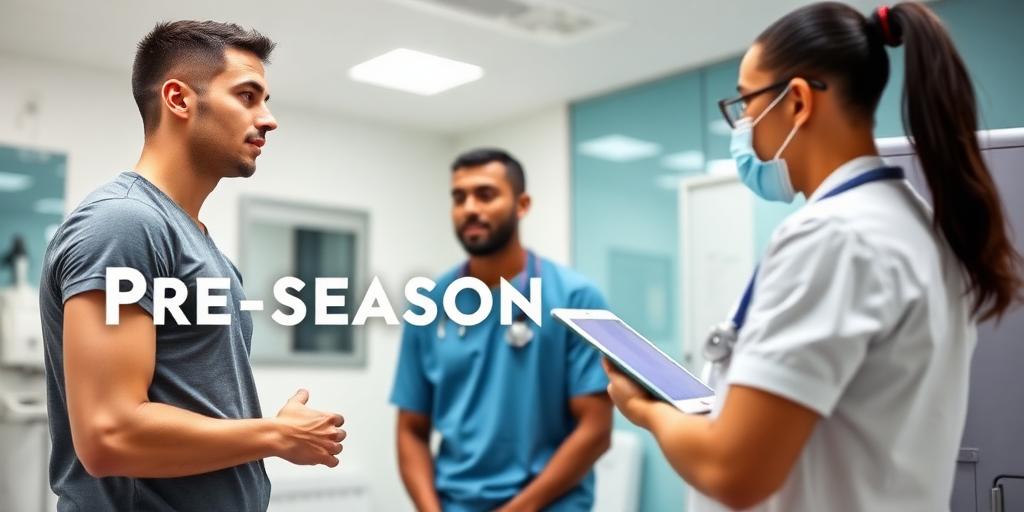The Importance of a Pre-Season Physical for Athletes
As an athlete, preparing for the upcoming season involves rigorous training, proper nutrition, and mental preparation. However, one crucial aspect that is often overlooked is the pre-season physical. A pre-season physical, also known as a sports physical, is a comprehensive health evaluation conducted by a healthcare professional to ensure an athlete is healthy and fit enough to participate in their chosen sport. This article will explore the importance of pre-season physicals and their benefits for athletes of all levels.
What is a Pre-Season Physical?
A pre-season physical is a thorough medical examination designed to assess an athlete's overall health and identify any potential health issues that may affect their ability to safely participate in sports. The examination typically includes:
- Medical History Review: The healthcare provider will ask about the athlete's personal and family medical history, including any previous illnesses, injuries, surgeries, allergies, and medications.
- Physical Examination: A comprehensive physical examination will be performed, including checking vital signs such as blood pressure and heart rate, evaluating vision, hearing, and reflexes, and assessing the athlete's musculoskeletal system.
- Cardiovascular Screening: The healthcare provider will evaluate the athlete's heart health to identify any potential cardiac abnormalities that could increase the risk of sudden cardiac arrest during exercise.
- Orthopedic Assessment: The athlete's joints, muscles, and bones will be assessed to identify any existing or potential musculoskeletal issues that could lead to injuries during sports participation.
Why are Pre-Season Physicals Important?
Pre-season physicals offer numerous benefits for athletes, including:
- Identifying Underlying Health Issues: A pre-season physical can help identify underlying health issues or medical conditions that the athlete may not be aware of. Early detection allows for timely treatment and management, preventing potential complications during sports participation.
- Preventing Sports-Related Injuries: By assessing the athlete's musculoskeletal system, a pre-season physical can help identify any existing weaknesses, imbalances, or previous injuries that could increase the risk of sports-related injuries. The healthcare provider can then recommend appropriate exercises, stretches, or protective measures to minimize the risk of injury.
- Ensuring Safe Participation: A pre-season physical ensures that the athlete is physically fit and healthy enough to participate in their chosen sport safely. It helps identify any medical conditions that could be exacerbated by exercise or increase the risk of sudden cardiac arrest, heatstroke, or other serious health issues.
- Optimizing Performance: By identifying any physical limitations or areas for improvement, a pre-season physical can help athletes optimize their performance. The healthcare provider can provide recommendations for improving strength, flexibility, and endurance, as well as advice on proper nutrition and hydration.
- Meeting Requirements: Many schools, sports organizations, and leagues require athletes to undergo a pre-season physical before participating in organized sports. This is to ensure the safety and well-being of all athletes involved.
Who Should Get a Pre-Season Physical?
Pre-season physicals are recommended for all athletes, regardless of age, skill level, or sport. Whether you're a young child playing recreational sports or a seasoned professional athlete, a pre-season physical is essential for ensuring your health and safety.
When Should You Get a Pre-Season Physical?
Ideally, a pre-season physical should be scheduled several weeks or months before the start of the sports season. This allows ample time to address any identified health issues, implement recommended interventions, and ensure the athlete is fully prepared for the upcoming season.
Conclusion
A pre-season physical is a vital component of an athlete's preparation for the upcoming season. By identifying underlying health issues, preventing sports-related injuries, ensuring safe participation, optimizing performance, and meeting requirements, pre-season physicals offer numerous benefits for athletes of all levels. If you're an athlete, make sure to schedule a pre-season physical with a healthcare professional to ensure you're healthy, fit, and ready to excel in your chosen sport.









